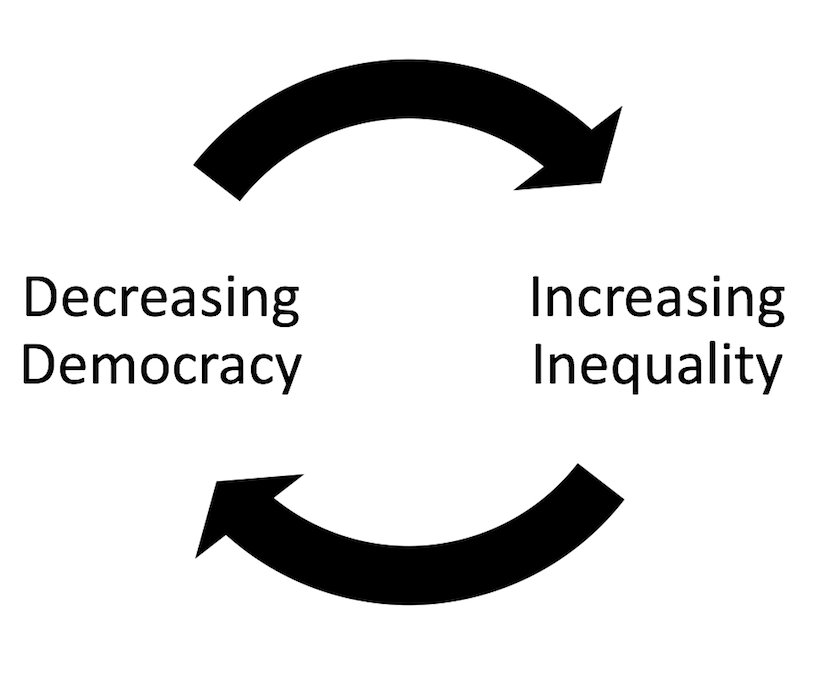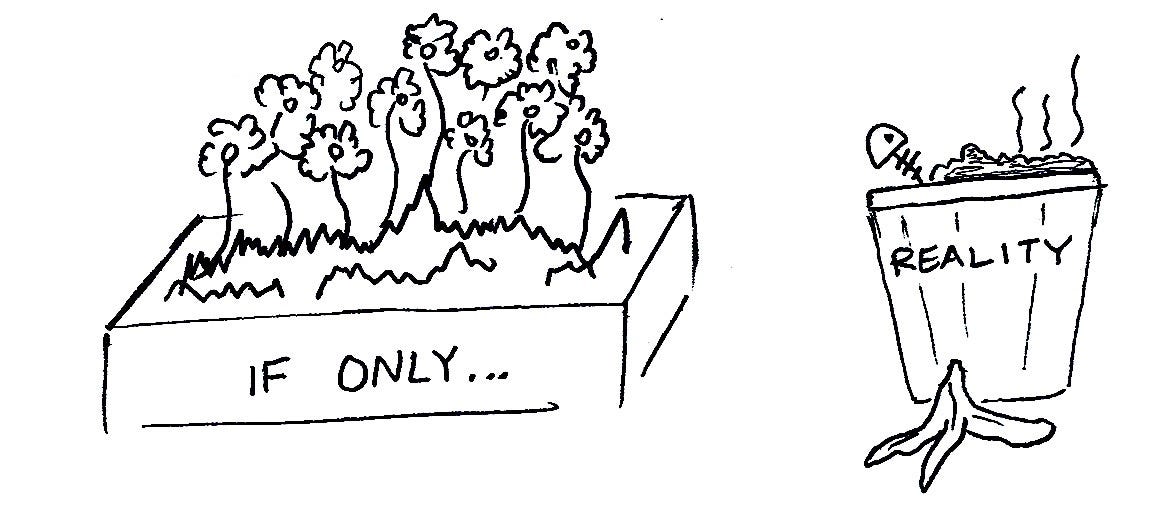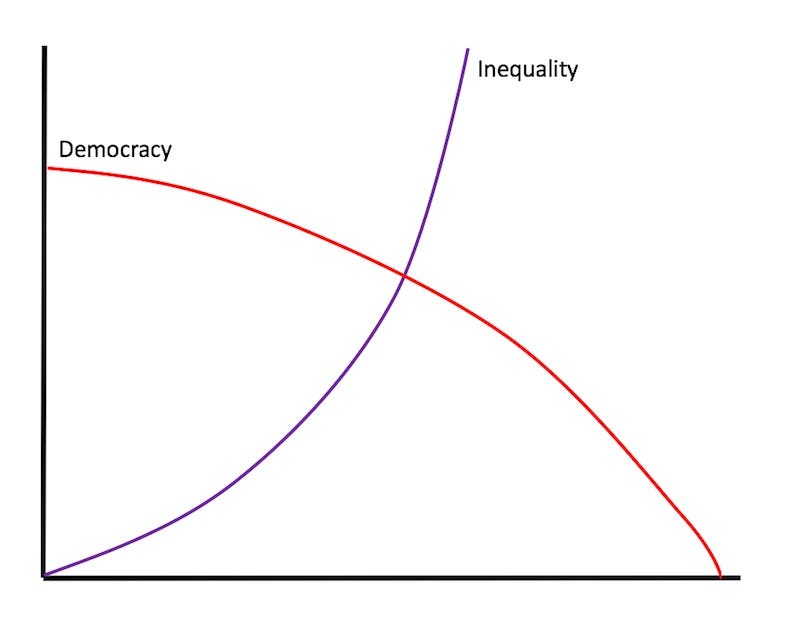Plutocracy by Design, Democracy by Will
Let us go back to the basics. Say this crowd is the country (all 8 of them):

Today, after ages of political theory, debate and war, we have chosen to organize the above crowd by a system we call ‘democracy.’ In its most naïve interpretation, each person owns 1/8th of any decision that impacts the collective.

That’s the naïve version. But there is a wrench in the works. That wrench is called property. You see, according to our founders, as evidenced by the Constitutional Convention records, there are “responsible men” or “owners of the nation” or “property owners” who are faced with a conundrum…

…and the conundrum is simple: If majority always wins, who protects the owners and their property?
Aristotle, who is accepted as the pioneer of western political thought, claimed it to be an injustice that the minority’s property wouldn’t be protected in the face of the rampaging herd of the majority who would control the government. A congruent sentiment was expressed by James Madison approximately 2000 years later during the 1787 Constitutional Debates. If democracy is a form of government by which the majority rules, there must be a mechanism by which “the minority of the opulent is protected against the majority,” as lectured by Madison.

The exact same question, but very different answers.
Aristotle: Limit inequality
Aristotle indicated that there is no intellectually honest discussion of democracy without factoring in wealth and property distribution. Attempting to do so is like discussing environmental protection policies without bringing up oil and gas production.
An extreme imbalance in the distribution of wealth annihilates robust democracy, and so he postulated a requirement to reduce inequality through a welfare state, in an attempt to reconcile this intrinsic contradiction. Not doing so leads to a vicious cycle that quickly results in a death spiral for democracy, and explosive inequality.

Per Aristotle, a state trying to prevent this would exercise a social contract between the “owners” of the country and the rest. The purpose of such a social contract would be to create a more equitable distribution of opportunities and benefits of life. Erosion of such a contract leads to the erosion of democratic decision-making itself — since the above perpetual engine would yield a terminal state of extremely concentrated wealth and political control.
Madison: Limit democracy
James Madison had a different answer. He didn’t like Aristotle’s teachings, apparently. Instead of reducing inequality by way of a welfare state, he chose to argue for reducing democracy. The responsible elites, a group he was part of, should own and operate the nation.

To be fair, the responsible elites were theorized to be compassionate leaders, well-meaning political philosophers who would shepherd the masses with their richer understanding of the world, sheer brilliance and benevolence; you know, like Donald Trump.
Madison expressed his fear that a growing part of society, suffering from inequities, “would “secretly sigh for a more equal distribution of blessings in life.” As history has shown, it turned out to be slightly more than a sigh.
Some highlights:
· 1792: Beginning of the abolition of property qualifications for white men, from 1792 (Kentucky) to 1856 (North Carolina).
· 1868: Citizenship is guaranteed to all persons born or naturalized in the United States, setting the stage for future expansions to voting rights.
· 1870: Non-white men and freed male slaves are guaranteed the right to vote by the Fifteenth Amendment to the United States Constitution. (However, for many years, some states were very successful at suppressing the vote, and still are today.)
· 1887: Citizenship is granted to Native Americans who are willing to disassociate themselves from their tribe by the Dawes Act, making the men technically eligible to vote.
· 1920: Women are guaranteed the right to vote by the Nineteenth Amendment to the United States Constitution. (However, in reality, the same restrictions that hindered the ability of non-white men to vote now also applied to non-white women.)
· 1924: All Native Americans are granted citizenship and the right to vote, regardless of tribal affiliation. By this point, approximately two thirds of Native Americans were already citizens.
· 1943: Chinese immigrants given the right to citizenship and the right to vote by the Magnuson Act.
· 1964: Tax payment prohibited from being used as a condition for voting in federal elections by the Twenty-fourth Amendment to the United States Constitution.
· 1965: Protection of voter registration and voting for racial minorities, later applied to language minorities, is established by the Voting Rights Act of 1965. This has also been applied to correcting discriminatory election systems and redistricting. However, evidently this is highly theoretical.
· 1966: Tax payment and property requirements for voting are prohibited in all U.S. elections by the Supreme Court in Harper v. Virginia Board of Elections.
· 1971: Adults aged 18 through 21 are granted the right to vote by the Twenty-sixth Amendment to the United States Constitution. This was enacted in response to Vietnam War protests, which argued that soldiers who were old enough to fight for their country should be granted the right to vote.
Notice 1966? Looks like something Aristotle would support. These tremendous leaps have been made through popular struggle and advocacy. By the above list alone, the present-day country should be close to a thriving, colorful and fragrant flowerbed of democratic discussions, activities, organization and efficient representation of the popular will.

Then why does it feel like it is the trashcan next to the flowerbed, belching out “choices” like Clinton or Trump?
Because of the design.
The concessions above still operate under the foundations of a representative democracy, or a republic, as dreamt up by Madison, et al. There are many mechanisms to achieve this, such as the electoral college, superdelegates for a major party’s primaries (Democrats) and gerrymandering. The elite and their property must be guarded, and by today’s standards, grown without bounds. The exponential growth in inequality fully mirrors the rapid loss of democratic representation in the country. (See: https://tinyurl.com/y9fwxzg5 for more information.)

Demolished democracy and exploding inequality: quite a potent death spiral combination.
Seems like a chicken and egg problem, yes? Can’t stop one without the other. Where to even begin? Here is the good news: it doesn’t matter where you start.
The Incorruptibles will attack both.
By mobilizing local candidates that are party-agnostic, The Incorruptibles aim to run leaders who are bound by policy proposals to address the grotesque inequities of our time. Leaders that emerge from coalitions created by The Incorruptibles are guaranteed to fully reject Super PAC and corporate funding.
There are many tools that can be used to implement a more inclusive welfare state. Most modern countries today use various policies, such as single-payer healthcare, tuition-free public colleges, and enforcing taxation laws already on the books, among others. It is not a secret that the most wealthy individuals and corporations in our country avoid paying taxes, depriving our treasury of funds due from the most well-off (Panama Papers, anyone?)
Measures such as these can set up a floor for a more egalitarian society, reversing the above vicious cycle into a virtuous one.
The trajectory for many of these changes looked robust in the late 1970’s. Then, a concerted wave of neoliberalism (with its roots in trickle-down economics) ) culminated in the atrocious Citizens United Supreme Court ruling in 2010. This decision essentially ruled that corporate campaign contributions constitute “free speech” and as such aren’t subject to limitation. How is that a democracy, again?
Check out more details here: https://theincorruptibles.us/
Reach out for volunteer opportunities here: https://theincorruptibles.us/join/
Join us in our fight for true democracy!